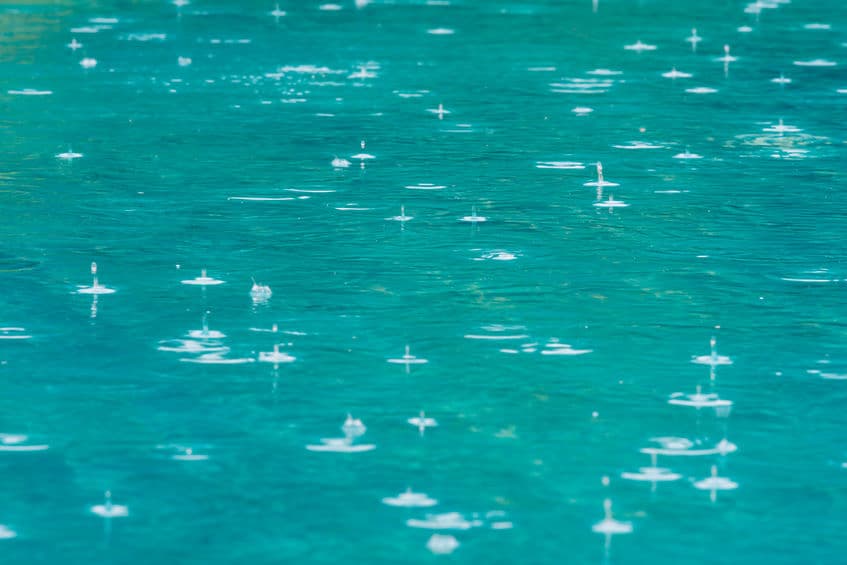A saltwater pool is relatively easy to maintain compared to other pools that use chemical chlorine. That doesn’t mean that saltwater pools don’t require maintenance and don’t have problems with water chemistry.
A saltwater pool typically becomes cloudy through a lack of chlorine but it can also be caused by excessively high/low pH, filtration problems, excessive calcium, or a sudden downpour of rain. Or a combination of the above.
Before finding chemicals to dump in the water, the key to quickly fixing a cloudy saltwater pool is to first determine where the problem lies.
Measure Chlorine
First you should understand the difference between free chlorine and total chlorine. According to the CDC your pool or spa should have a free chlorine level of between 1 – 3 ppm (parts per million). The Pool & Hot Tub Alliance (formerly Association of Pool and Spa Professionals) recommends a higher free chlorine level of between 2 and 4 ppm. I’ve always kept our pool within a 1 – 3 ppm range which is the level I’m most familiar with. Either way, your chlorine level should be within those ranges.
Depending on how low your chlorine is you might use the Super Chlorinate feature of your salt system to quickly raise chlorine or if you have Shock or other chlorine product handy, you might turn to that to quickly raise chlorine. This is a consideration for a very cloudy pool and during very hot weather to clear things up quickly.
If your chlorine is showing 0 or close to it, your chlorinator or salt cell specifically might be the problem so you’ll need to get that sorted out asap.
Measure pH
pH should be between 7.2 and 7.8 in a pool. When pH is too high, it can not only cause the water to get cloudy but can also irritate the eyes of swimmer and cause scaling on the pool.
You can lower pH by using a commercial product like pH Down or other pH reducer that tends to quickly get pH lowered. Just keep an eye on your alkalinity as that can move down too when you lower pH.
What if your pH is too low? You can quickly raise pH by using baking soda. Yes, the same baking soda you use in your kitchen or fridge but you might need more than a box you bought in the store. Check with your pool comoany as chances are they sell large quantities for this purpose. While a commercial product like pH Up is also usable, chemical products like this tend to use baking soda as a key ingredient anyways.
Check Your Filter
Improper water filtration can cause significant water problems and make it difficult for pool water to remain clear. If you use a sand or D.E. filter, when was the last time you backwashed it? How old is the sand or diatomaceous earth and does it need to be replaced?
If you have a cartridge filter, how old are the cartridges and when was the last time you rinsed them? I can speak from personal experience that dirty and/or past-their-shelf-life cartridges slow down water flow back into the pool, and often return dirty water. I’ve rinsed cartridges, reinstalled them and the next morning looked into the pool and seen small piles of sand or other debris on the floor of the pool close to the water return jets. The cartridges were having trouble holding onto debris after being cleaned.
If you’ve recently had algae or another significant problem, that can cause havoc with filtration devices too. I’ve found that a bad algae outbreak required one and often two filter cartridge rinses after getting rid of the algae.
Measure Calcium
Calcium problems tend not to be a problem with salt water pools but in case you don’t have a salt water pool or have a calcium problem anyways, test your water for calcium to see if it’s off and needs to be adjusted.
I’ve never had an issue with calcium in our saltwater pool. Calcium hardness is ideal between 200 – 400 ppm. Below 200 ppm can erode your pool and pool accessories while a level above 400 ppm can clog your filter which creates other problems.
Having no personal experience with calcium problems myself, I’d go directly to my pool company with a water sample to confirm the problem and ask for help to fix it.

Check Water Level
Your water level can vary greatly during the summer especially if you add water and accidentally added too much or you just got a summer downpour and rain significantly increased your water level. I’ve experienced several large rainfalls during the summer where a several hour storm increased water level in the pools by several inches. To the point where the water level was suddenly at the very top of the skimmer and debris was floating in the pool because the water level was too high to be properly skimmed.
Adding water quickly to the pool throws chlorine and other chemistry levels out of whack and can cause very cloudy water quickly. When this happens, drain water to the proper level, then measure chlorine and other water chemistry factors and act accordingly. When water level is far too high, get that sorted out first and then deal with water chemistry.
Conclusion
Cloudy water is typically caused by a lack of chlorine but can be caused by several other factors listed above. Ensure that your water level is within range before adding chemicals or doing anything else because a large amount of recently added water to the pool can throw chemistry off and cause water to become cloudy.
Also ensure that maintenance is up to date including rinsing or backwashing the filter and that other aspects of water chemistry are within accepted ranges.

